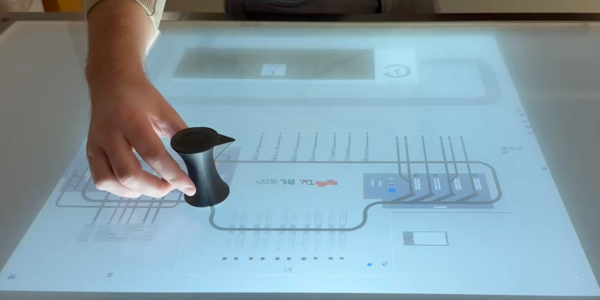Ekrem Toroman is an international student at TU Graz. He supports himself and knows what it’s like to work alongside his studies. In this article you’ll learn how to successfully finance your studies.
Working while studying
Graz is the self-proclaimed feelgood capital of Austria, where you can find many restaurants, cafés, bars and catering businesses who are always on the lookout for personnel. And you can usually arrange your working hours flexibly. Another good way to earn money is working for bicycle delivery services – especially for those who like to ride a bike. There are also many other areas where students are willing to be hired as temporary helpers, for example as gardening helpers, help in various offices, temporary help in supermarkets and department stores, home help for pensioners and so on.
Tip 1: At the beginning of your studies it’s advisable to look for a job that is not too demanding. It’s important that your working hours combine well with your studies. I’ve had good experiences in the catering trade. There was always work and I always got tips! I, for example, financed all my shopping in the supermarket with this tips for a long time. Over time you’ll make progress in your studies and learn lots of new things. When you’ve got a solid foundation of knowledge, I advise you to look for a job in your field of study.
Find a student job
There are many job portals with job ads on the internet. I’ll mention just a few as examples:
• https://www.studentjob.at/
• https://www.unijobs.at/jobs
• https://www.willhaben.at/jobs/
• https://www.uni.at/
• https://www.karriere.at/
Tip 2: Search the internet for companies that interest you and send "unsolicited applications" there with your CV and a letter of motivation. There are companies that would find it practical to hire students for 10 to 20 hours a week, but have never thought about it – until your application comes in.
There are also interesting job offers in newspapers. If a job advertisement catches your interest, don't wait too long with your application. Most ads include an email and phone number. Depending on what your German language skills are like, you can decide whether you want to call or write an email. For most advertisements, you are asked to send an email with a CV and a letter of motivation. Remember that first impressions count, so make sure you make a good impression!
Tip 3: Before you start looking for a job, prepare a good CV, and more importantly, a very good letter of motivation.
Job found. Now what?
Explain to your employer that as a foreign student you need a work permit which has to be filed by the employer. Don’t present this as too big a thing, but rather as just a formal matter. Students from third countries of the European Union (EU) require an employment permit for employment in Austria. The application for this is made to the public employment service (Arbeitsmarktservice AMS), for Graz this is AMS Graz West in Niesenbergergasse 67-69, 8020 Graz. The work permit must be extended every twelve months.
Tip 4: It is best to apply for an extension of your work permit 1 month before expiry.
How much are international students allowed to work alongside their studies?
As international students, we are allowed to work a maximum of ten hours per week in bachelor's programmes and a maximum of twenty hours per week in master's programmes. If we want to work more, the AMS carries out a labour market review beforehand. This will determine whether this position can be filled by Austrian jobseekers. If so, your request will be denied. Here you can find more information about the labour law for students from third countries.
Tip 5: As a bachelor's student, it is easier to get a work permit for more than ten hours a week if you‘ve already worked for a few months in the company. The same applies to master's programmes if you wish to work more than 20 hours per week.
International students are also allowed to work full-time during the semester break. It’s important to apply for a work permit in good time.
How much tax do students have to pay?
If you work, you have to pay taxes. What do you have to watch out for to avoid unpleasant surprises? In Austria, up to an annual income of 11,000 euros, you don’t have to pay income tax. Anything above this amount is taxed. You can get an overview of the earnings and the respective tax payments at FinanzOnline for more information. For more information about income tax, visit the website Income taxes abroad – Austria at europa.eu.
Marginal employment (geringfügige Beschäftigung) means that the wage is lower than 460.66 euros monthly. Anything above this level is considered part time.
In the case of marginal employment, we have to pay our own social insurance with the ÖGK - Austrian Health Insurance Fund for students (German language website).
In the case of part-time employment, social security is paid for by the employer.
Tip 6: At the beginning of each year, file a tax return for the previous year. In this way you can get back any excessive tax you paid. The deadline for submitting your tax return can be found at österreich.gv.at.
When did I pay too much tax?
If a person works ten months marginally (geringfügig) and two months full-time, the income tax for these two months is deducted from his/her salary. However, if no more than 11,000 euros gross were earned in the entire year, he/she can get back the income tax amount for these two months.
When do back-taxes have to be paid?
If, for example, you have two jobs which individually do not exceed the income tax limit in a month, but exceed 11,000 euros for the whole year, back-taxes have to be paid.
When does social insurance have to be paid in arrears?
If, for example, you have two marginal jobs, where the wage does not exceed 460.66 euros each, but together they do, about 15 per cent of the total monthly income must be paid to the Austrian Health Insurance Fund (ÖGK, website in German language) for each month in which the limit was exceeded.
Lost your job?
In certain situations, international students who have lost their jobs are also entitled to unemployment benefit from the public employment service AMS. Principally, if you have worked for at least 52 weeks in the last two years and have received a wage above the marginal earnings threshold (Geringfügigkeitsgrenze) – i.e. more than EUR 460.66 - you are entitled to unemployment benefit.
On the AMS website at Test - entitlement to unemployment benefit (in German language) you can check whether you are entitled to unemployment benefit. Here you can also find general information on the topic of unemployment benefit.
Where else can I get financial support?
Students who find themselves in a financial emergency also have the possibility to receive financial support from the Student Union.:
- Social funds of the TU Graz Student Union (HTU Graz) – website in German language
- Social funds of the Austrian Student Union (Vienna) – website in German language
- Support money of the TU Graz Student Union (HTU Graz) – website in German language
As you can see, there are a few things to consider in order to be able to work in peace and quiet while studying. I definitely advise you to read the information in this post and also to visit the pages where you can get more information.
Student jobs in moderation and with purpose
Some heartfelt advice from me to you: work as much as necessary and as little as possible. Don’t forget why you’re here. Your studies must remain at the centre of attention.
Making money is certainly a good thing. From time to time you’ll get the opportunity to work more and earn more. But what can happen is that you cannot attend some courses, which in turn leads to less motivation for studying.
So here is some heartfelt advice from me to you: work as much as necessary and as little as possible. Don’t forget why you’re here. Your studies must remain at the centre of attention, so you’ll not have any problems with your visa. Furthermore, the harder you study, the sooner you will find a job that is related to your studies. This will strengthen your motivation phenomenally.
Tip 8: The perfect balance for me is to work a maximum of two days a week. In this way you can easily work up to 16 hours a week and earn enough to pay your rent and have something left over for the rest of your life. Also, work more during the holidays! During the summer holidays you have much more time and should use this time to earn money and save for financial emergencies.




